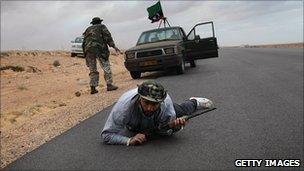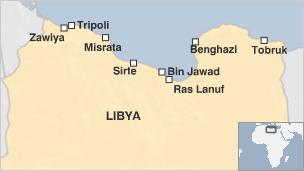Libya no-fly zone a UN decision, says Hillary Clinton
- Published
International calls are growing for a no-fly zone over Libya
Any decision to impose a no-fly zone over Libya should be made by the UN and not by Washington, US Secretary of State Hillary Clinton has said.
Mrs Clinton said it was important such a move came from the Libyan people, rather than being a US-led effort.
Calls for military intervention are growing as pro-Gaddafi forces bombard areas held by Libyan rebels.
Meanwhile, Col Gaddafi has made a defiant speech on Libyan TV, labelling rebels and opposition leaders traitors.
Addressing a room full of cheering supporters he again claimed that the rebels had been brainwashed by al-Qaeda.
The rebel forces are fighting to end Col Gaddafi's 41 years in power, and more than 1,000 people are believed to have died. Some 200,000 others have been displaced by the fighting.

Rebel fighters have been pushed back by pro-Gaddafi government forces
Mrs Clinton reiterated her government's call for Col Gaddafi to step down peacefully, but warned that the crisis in Libya could be protracted.
"I think it's very important that this not be a US-led effort, because this comes from the people of Libya themselves," Mrs Clinton told Sky News.
"We are going to support the efforts that are being made, because we think that the people of Libya themselves have to be supported, and we know how difficult this struggle is."
'Full spectrum'
US President Barack Obama and UK Prime Minister David Cameron discussed a possible no-fly zone on Tuesday, but both countries maintain that any intervention must have wide international support.
John McCain: "They are pleading with us to enact a no-fly zone"
A White House statement said the two leaders discussed a "full spectrum of possible responses" in their telephone call.
It is believed other options include more surveillance, humanitarian help and the enforcement of an arms embargo on Libya.
Mr Cameron told the BBC: "We have got to prepare for what we might have to do if he (Gaddafi) goes on brutalising his own people."
The UK and France are working on a UN Security Council resolution for a no-fly zone, however Russia has already stated its opposition to military intervention.
Nato defence ministers will discuss options for Libya on Thursday and Friday.
In Washington, President Obama has faced criticism that he is being too cautious over the turmoil in Libya.
Republican Senator John McCain said: "Every day and every hour that goes by, innocent Libyans are being attacked and massacred from the air."
Calls for a no-fly zone have also come from the Organisation of the Islamic Conference, which represents Muslim countries, and Gulf Arab states.
In Tripoli on Tuesday night, Col Gaddafi arrived at a hotel surrounded by tight security and held exclusive interviews with Turkish and French television stations.
He then left without addressing other journalists, some of whom had been waiting several hours to hear him.
On Tuesday, forces loyal to Col Gaddafi bombarded the rebel-held western town of Zawiya all day, shelling its suburbs with tank and artillery fire and trying to seize control of the town's main square.
One resident spoke of seeing 50 tanks and dozens of pick-up trucks loaded with pro-Gaddafi troops.

The main hospital is said to have been overwhelmed with casualties.
"I don't know how many are dead - they tore Zawiya down to ashes," a source in the town told the BBC.
In eastern Libya, rebel forces in the oil port of Ras Lanuf came under frequent air and artillery attacks. At least 30 people were reported injured.
The BBC's Wyre Davies in Tripoli says Col Gaddafi's forces are making significant military gains, consolidating their hold on western Libya.
In other developments, the European Union is expected to widen sanctions against Libya to include its sovereign wealth funds and central bank, EU officials say.
The sanctions, due to go into effect on Friday, will restrict Libyan organisations that hold stakes in a host of European companies, AP news agency reported.
The move goes beyond those sanctions already approved by the UN Security Council which targeted Col Gaddafi and his family and associates.